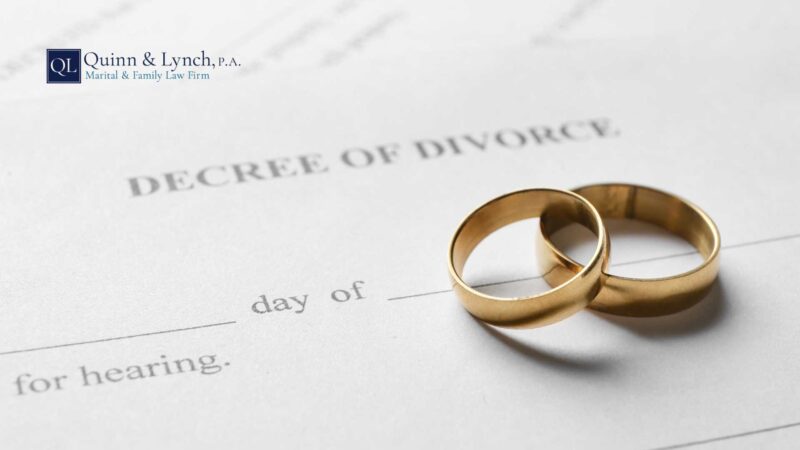The divorce mediation process can be a great way to help spouses reach a divorce agreement, but when is divorce mediation not recommended in Florida? At Quinn & Lynch, P.A., our Tampa divorce lawyer team understands that such cases are unique. While alternative dispute resolution methods, like the divorce mediation process, can be helpful for avoiding court interventions, there are some situations when traditional litigation may be more appropriate.
Here, our legal professionals answer when is divorce mediation not recommended in Florida, and when is mediation a good idea in divorce in Florida?
Our Tampa divorce attorneys are here to guide you through the litigation or mediation process and help you make informed decisions.
Call (813) 223-7739 or contact to speak with an experienced divorce attorney in Tampa, FL.
What is Mediation in Divorce?
Divorce mediation involves two spouses working with a neutral third party, known as a divorce mediator, to address and resolve various aspects of the divorce.
During mediation sessions, the mediator facilitates discussions between the parties involved, helping you reach mutually acceptable agreements on important issues such as child custody, child support, property division, and spousal support.
Unlike traditional divorce proceedings, divorce mediation typically involves open communication and collaboration, allowing both parties to have more control over the final divorce agreement.
This voluntary process can lead to mutually beneficial solutions and a fair divorce agreement without the need for lengthy court proceedings.
So, what’s the drawback? When is divorce mediation not recommended in Florida family law courts?
Divorce mediation offers a way to manage marital disputes and reach agreements efficiently, making it a preferred option for many. However, in cases involving domestic violence, substance abuse, or a significant power imbalance, divorce mediation may not be recommended.
Consulting with divorce attorneys with legal expertise in the Florida divorce mediation process can help provide legal counsel tailored to your specific situation. Contact a Tampa divorce mediation lawyer at Quinn & Lynch, P.A. to learn more.
Benefits of Divorce Mediation in Florida
Choosing divorce mediation in Florida offers several advantages that can make the divorce process smoother and less stressful for you and your spouse. One of the primary benefits of divorce mediation in Florida is being able to reach a fair agreement on marital issues without the need for traditional litigation during divorce proceedings.
Mediation involves a divorce mediator who facilitates open communication between spouses and helps with drafting agreements regarding the divorce. Compared to traditional litigation, the mediation process saves time and costs involving legal professionals. It also allows more control over outcomes for both parties involved.
Divorce mediation also fosters a more amicable environment, which can be especially beneficial if you have children, as it promotes healthier child custody arrangements.
How Does Divorce Mediation Work in Florida
Understanding how divorce mediation works in Florida can help you decide if it’s the best option or if traditional litigation better suits your situation.
Divorce mediation is a conflict resolution process that gives both parties involved the chance to work together with a neutral third party to address important issues like child custody, division of marital assets, and alimony. The goal is to reach mutually acceptable family law agreements, reducing the chances of future disputes that could lead to court interventions.
During mediation sessions, you’ll have the opportunity to openly discuss your concerns and find solutions that work for both of you. This approach helps you avoid the stress and expense of traditional litigation while keeping more control over the decisions that impact your family and future.
Florida Divorce Mediation Process
The divorce mediation process begins when you and your spouse seek assistance from divorce mediators—a trained, neutral third party who helps guide you through honest, respectful conversations.
During these mediation sessions, you’ll talk about important topics such as dividing your property, arranging child custody, and deciding on child support.
Litigated Divorce Process in Florida
Litigated divorce is the traditional way of ending your marriage with legal representation and court intervention. Instead of working out agreements with your spouse privately with a divorce mediator, you present your case before a judge.
In such cases, you’ll likely have your own attorney who will gather information, file the necessary paperwork, and speak on your behalf. Throughout the traditional litigation process, you may be required to attend hearings, disclose financial information, and follow timelines set by the court.
If you and your spouse cannot agree on issues like child custody or property division, the judge makes the final decision. While this path can lead to fair results, it often involves more time, financial resources, and added stress. Our attorneys can walk you through the process of how to file for divorce in Florida if you know you’ll need litigation.

When is Mediation Not Recommended for Divorce in Florida?
So, when is divorce mediation not recommended in Florida divorces?
Sometimes, the mediation process doesn’t fit your situation, and you may need judicial intervention. For instance, if you’re dealing with domestic violence, complex financial issues, have an ex-spouse who may be hiding assets, or other serious barriers to finding common ground, mediation might fail to protect your rights or produce a fair divorce agreement.
Traditional divorce proceedings may be better for your situation, and seeking assistance from Tampa divorce attorneys who understand Florida divorce law can help you move forward.
High-Conflict and Mental Health Concerns
If you and your spouse are unable to have calm, productive conversations, or if one of you has mental health concerns that interfere with effective communication, mediation may not be the right option for resolving your divorce.
Mediation relies on both parties working together respectfully to address issues like child custody, property division, and spousal support. When emotions run too high or mental health challenges prevent clear communication, mediation sessions can quickly become unproductive, increasing stress rather than helping you find solutions.
In these situations, turning to a skilled divorce lawyer is essential. We can provide the structure and support needed to move your case into court proceedings, where a judge can make decisions based on the evidence and legal arguments presented.
While mediation works for some couples, it’s not always the best solution, especially when communication and cooperation are major challenges. With the guidance of an experienced family law attorney, you can confidently approach the divorce process, knowing your rights and interests are being protected.
Substance Abuse
When one spouse struggles with substance abuse, it can make honest communication during mediation nearly impossible. This often affects judgment and trust, making it hard to work together to solve important marital issues. Mediation only works when both parties are willing to be open, honest, and cooperative. Mediation usually doesn’t lead to any real solutions if these things are missing.
Substance abuse can also raise concerns about safety, financial stability, and whether the affected spouse can meet their responsibilities. In such situations, involving legal professionals and going through traditional court proceedings may be the best option. In court, evidence of alcohol or drug abuse can be presented to a judge, who will make decisions that protect your rights and ensure the safety of your children.
Going through the court system gives you the structure and legal protection you need. A judge can impose protections, like supervised visitation or requiring substance abuse treatment, to ensure everyone involved is treated fairly.
Domestic Violence
Domestic violence is a critical reason why mediation is not recommended in Florida. When domestic violence is present, the voluntary process of mediation is compromised, as the domestic violence abuser may exploit the situation to create a significant power imbalance.
In such cases, it becomes nearly impossible to reach mutually beneficial solutions, as fear and coercion often dictate the outcome and don’t help with future disputes.
Additionally, for cases involving domestic violence, concerns like hiding assets may arise, further complicating the divorce process. Because mediation fails typically in situations involving domestic violence, traditional divorce proceedings are often necessary to ensure fairness and safety.
A Tampa family law domestic violence attorney can provide the legal representation and guidance needed, helping victims of domestic violence navigate the system while seeking assistance and protection.
One Spouse is Controlling, Coercive, or Narcissistic
If one spouse is controlling or manipulative, divorce mediation fails to be effective or fair. Mediation depends on both parties being willing to communicate openly and honestly about important marital disputes. When a spouse uses manipulation or control to dominate the discussions, it silences the other party, creating an environment where true collaboration is impossible. This behavior prevents reaching a common ground and risks producing an agreement that heavily favors the controlling spouse, leaving the other party at a disadvantage.
Mediation is unlikely to provide the fairness and protection you need in these situations. Instead, working with an experienced divorce attorney can help you move your case to a more structured and secure setting, such as traditional litigation.
Through court interventions, your family law attorney can present evidence of manipulative tactics or controlling behavior to a judge, ensuring these dynamics are addressed and your voice is heard. This process ensures that decisions are made based on facts and fairness, not intimidation or coercion.
One Spouse Feels Intimidated by The Other Spouse
Divorce mediation relies on both parties speaking up for themselves without fear. When one spouse feels intimidated, open communication breaks down, and mutually acceptable agreements may never happen.
In this scenario, you’ll likely benefit from seeking assistance through judicial intervention, especially if domestic violence has occurred during the marriage. An experienced divorce attorney from our team can help you with property division, child support, and other issues without placing you in a position where you feel pressured or unsafe.
Major Disputes Over Child Custody Arrangements
If major disputes arise over child custody arrangements and you cannot find common ground, divorce mediation may not give you the outcome your family needs.
Traditional divorce proceedings may offer better results in these situations. Our Tampa child custody lawyers can provide skilled legal representation and present your case before a judge who will carefully consider what’s best for your children. This approach may be more time-consuming, but it can offer a more secure solution when your children’s well-being is at stake.
Complex Financial Issues
Divorce mediation is not recommended in Florida for cases involving complex financial issues, especially when there are significant assets or complex financial portfolios at stake. Mediation relies on full financial disclosure, but in such cases, if one party is hiding assets or undervaluing key holdings, this makes the process difficult to ensure a fair resolution.
Our Tampa high-asset divorce attorneys provide the financial knowledge and legal expertise needed to address these challenges effectively. With proper legal counsel, the parties involved can better navigate disputes over financial resources, ensuring that the division of financial resources is equitable and legally sound. Mediation in these situations often lacks the structure necessary to resolve such high-stakes and complex financial issues.
One Spouse Has An Advantage With Marital Assets
Divorce mediation may not be suitable in Florida when one spouse has exponentially more financial knowledge regarding marital assets than the other, particularly in cases involving complex financial portfolios. The mediation process relies on transparency and full financial disclosure, but a spouse hiding assets or undervaluing property can create a significant power imbalance. This often prevents the mutually beneficial solutions mediation seeks to achieve. In cases involving a power imbalance where full financial disclosure is critical, consulting a Tampa asset protection attorney is crucial, as they can provide legal advice and ensure all marital assets are accounted for.

Alternative Dispute Resolution Methods in Florida
While divorce mediation is a popular way to resolve disputes, it’s not the only option available. In some cases, other alternative divorce solutions in Florida may be a better fit for your unique situation.
Depending on the circumstances of your divorce, you might consider traditional litigation, collaborative approaches, or limited representation as ways to address important issues and protect your rights. Each option offers its own benefits and challenges, giving you the flexibility to choose the path that works best for you and your family.
Traditional Divorce Litigation
If you’re dealing with a high-conflict divorce, traditional divorce litigation can provide the structure and legal protections needed to address complex disputes. Unlike collaborative divorces or mediations, litigation involves presenting your case in court before a judge who decides on unresolved issues like child custody, property division, or alimony. This is one of the most effective high-conflict divorce alternatives in Florida, especially for situations where cooperation or open communication is impossible.
In this process, your experienced divorce attorney will take the lead in gathering evidence, preparing legal documents, and building a strong case to represent your interests. This approach is particularly valuable in cases involving significant assets, complex financial portfolios, or when full financial disclosure is difficult to obtain.
If concerns like domestic violence or substance abuse are present, litigation ensures that your case is handled with the seriousness and attention it requires, offering protections that are not always possible in other alternative dispute resolution options.
When our Tampa divorce attorneys negotiate on your behalf, we work tirelessly to advocate for your rights and pursue the best outcome under Florida family law. With skilled legal representation from trusted legal professionals, you can feel confident that every aspect of your case is addressed, no matter how challenging or contentious the situation may be.
Collaborative Divorce
Collaborative divorce is one of the alternative dispute resolution options that allow you to work with your spouse in a more cooperative environment without unnecessary court interventions. This process focuses on open communication and transparency, making it easier to reach agreements on marital issues.
The main difference between collaborative divorce vs mediation in Florida lies in the process and level of support each provides. Both options aim to resolve divorce issues without extended court proceedings, but they differ in how they are structured.
In mediation, you and your spouse work with a neutral third party (the mediator) to reach an agreement on issues like property division, child custody, and alimony. The mediator doesn’t take sides or provide legal advice; they simply facilitate the conversation and help you find common ground.
Collaborative divorces involve a team of legal professionals, including a Tampa collaborative divorce attorney, certified divorce financial analysts, and sometimes mental health experts, all working together to help both parties reach a fair and amicable agreement. Each person has their own divorce lawyer to provide legal counsel throughout the process, ensuring both spouses are fully informed and protected.
Collaborative divorce offers more support, making it a good option if you need additional help with complex financial or emotional issues during your divorce. While both methods prioritize cooperation, collaborative divorce provides more structure and professional support than mediation alone.
Limited Representation for Divorce
Limited representation is a flexible and practical option for individuals going through a divorce who need professional legal support but don’t require full representation. With this approach, you can hire a family law attorney to handle specific tasks, such as reviewing your financial disclosures, negotiating child custody arrangements, or drafting agreements without committing to full legal representation.
As one of the more cost-effective alternative dispute resolution options, limited representation ensures you still benefit from the legal expertise of an experienced attorney while maintaining control over parts of the process you feel comfortable managing yourself. For example, you might handle initial paperwork filing but seek guidance when preparing a final divorce agreement or navigating court requirements.
This option allows you to make informed decisions while ensuring that you’re not disadvantaged during critical moments in your divorce.

How a Tampa Divorce Mediation Lawyer Can Help
Dealing with divorce can be overwhelming, but Quinn & Lynch, P.A. is here to help you every step of the way. Whether you’re unsure if mediation is the right choice for your situation or looking for divorce mediation tips and tricks to make the process smoother, our knowledgeable Tampa family law attorneys are here to provide the legal expertise and legal representation you need.
Our divorce attorneys take the time to understand your unique circumstances and explain your options clearly, empowering you to make informed decisions that protect your rights and set your family up for a better future. From offering tailored legal expertise to experienced legal representation in Florida family law courts when necessary, we’re here to help you achieve the best possible outcome for your case.
Call (813) 223-7739 or contact us online to speak with an experienced Tampa family law mediation attorney today.















